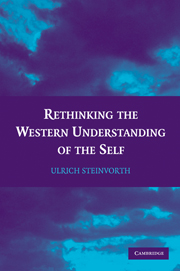Book contents
- Frontmatter
- Contents
- Preface
- Part I Introduction
- Part II Basics of Philosophical Psychology
- Part III The Cartesian Self in History
- Part IV Value Spheres
- Part V A Self-Understanding Not Only for the West
- Chapter 20 Is the Core Idea of Modernity Realizable At All?
- Chapter 21 Harnessing Extraordinariness
- Chapter 22 Cartesian Modernity
- Chapter 23 The Undivided, Universally Developed Individual
- Chapter 24 The End of History?
- Select Bibliography
- Index
Chapter 20 - Is the Core Idea of Modernity Realizable At All?
Published online by Cambridge University Press: 05 June 2012
- Frontmatter
- Contents
- Preface
- Part I Introduction
- Part II Basics of Philosophical Psychology
- Part III The Cartesian Self in History
- Part IV Value Spheres
- Part V A Self-Understanding Not Only for the West
- Chapter 20 Is the Core Idea of Modernity Realizable At All?
- Chapter 21 Harnessing Extraordinariness
- Chapter 22 Cartesian Modernity
- Chapter 23 The Undivided, Universally Developed Individual
- Chapter 24 The End of History?
- Select Bibliography
- Index
Summary
The core idea of modernity, universal liberty, accords everyone an equal right to use their capabilities the way they want to. It has always raised doubts if it is realizable. For no society can survive without tuning the intentions and interests of its members. The traditional idea, realized in all pre- and post-modern societies, is that tuning requires masters and morality. The revolutionary idea of the economists was that the market replaces them. Meanwhile we know that markets do not suffice; so, are we not to return to the masters and drop the idea of universal liberty?
Actually, universal or equal liberty is often understood in an illusionary way as a right of self-determination, namely, as a right to decide on one's life without regard to other people. Yet though it includes the individual's right to her private affairs, most parts of our lives are interwoven with public affairs. So to understand the right to self-determination as the right to choose one's life in an isolation in which one might be unmolested by other people would be an illusion. Rather, in the first place, it is the equal right of everyone to participate in the process by which the conditions of society are fixed and transformed from a development individuals are dependent on to one they rule in cooperation. Such a process does not only comprehend political decisions but includes those in all serving value spheres. Hence, equal liberty implies the right to equal participation in any serving sphere.
- Type
- Chapter
- Information
- Rethinking the Western Understanding of the Self , pp. 169 - 175Publisher: Cambridge University PressPrint publication year: 2009

